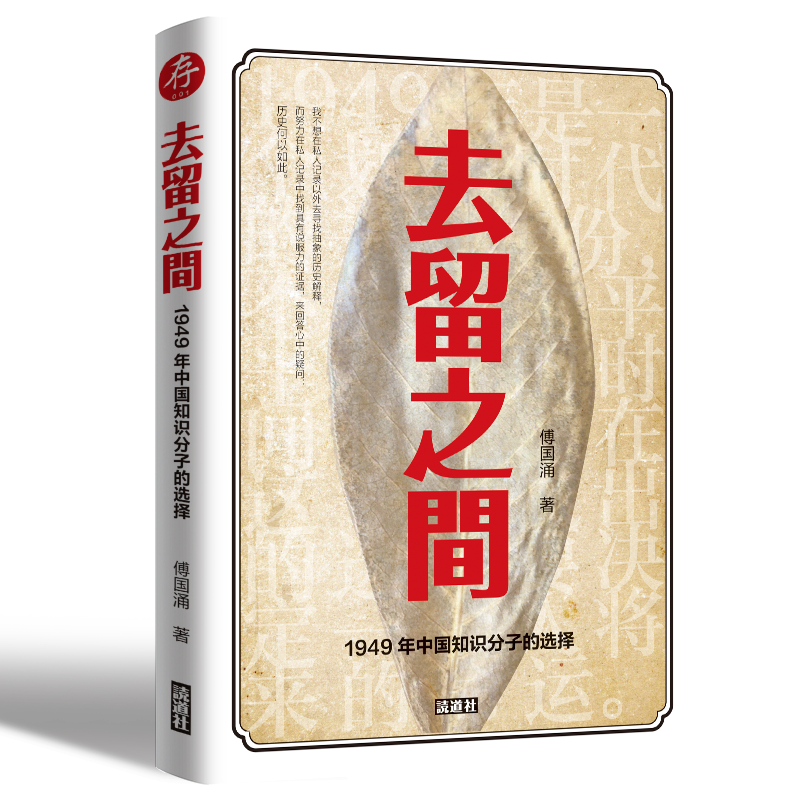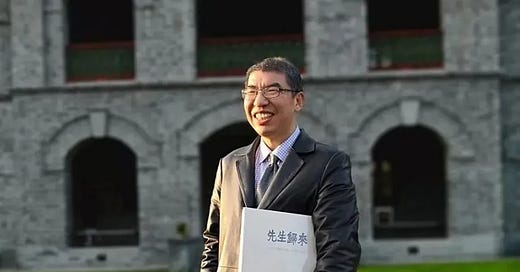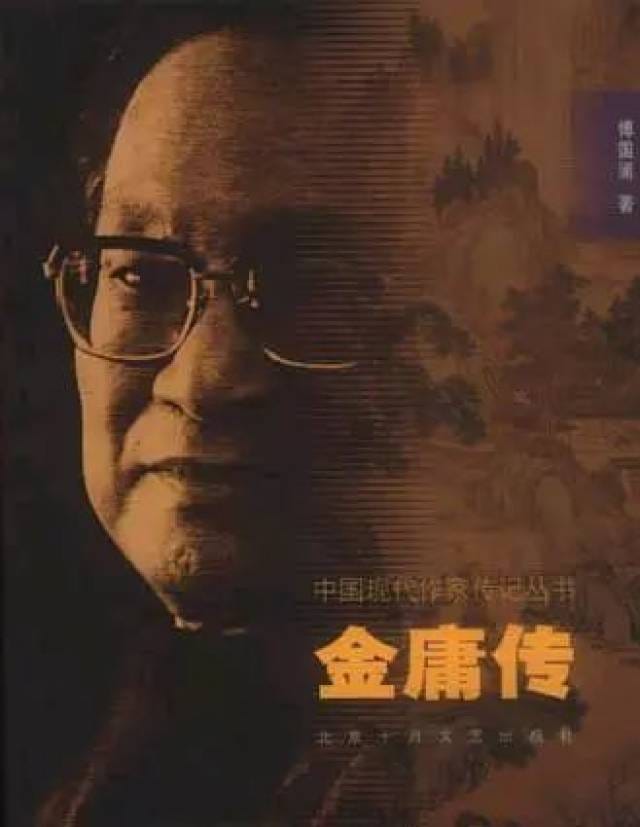傅国涌的民国史研究及写作:在边缘地带播下公共讨论的火种
Fu Guoyong’s Research on Republican China: Sowing the Seeds of Public Discourse in the Margins
作者:海星
By Hai Xing
The English translation follows below.
傅国涌简介:
傅国涌:中国独立作家,历史学者,公共知识分子。1967年出生在浙江乐清,曾在《书屋》、《随笔》等报刊杂志发表大量文章,出版《百年辛亥》等多本历史著作。重点关注中国近代史,尤其是言论史,以及知识分子研究。2017年曾获独立中文笔会自由写作奖。除写作著述之外,近年来推广民间教育,倡导人文传统以及理性与美的语文教育。
傅国涌的民国史研究及写作:在边缘地带播下公共讨论的火种
作者:海星
傅国涌走了,在这个注意力极易耗散的网络时代,他的遽然离世却意外引发了全网悼念。这悼念没有官方推动,也不是名利场的利益表达,而来自无数普通人发自内心的缅怀与感念。悼念他的,不仅有学界同仁、文化圈的友人,还有大量他素未谋面的读者以及受益于他思想的人。这悼念穿透了社交媒体的表层热闹,构成了一个罕见的共识时刻:在当下的中国,一个知识人以及他践行的思想,如何才能留下坚实的足迹?
为什么傅国涌会成为这样一种公共情感的触发点?这是一个值得深思的问题。他不是体制内的主流学者,没有头衔光环,也不依附于官方机构的学术庇荫;他不是网红,少有夸张的语言与煽动性的姿态。他一生行走于民间,写作于僻处,朴素、不张扬,却以几十年如一日的坚持,与其他良知学者一起,默默重塑了我们对近代中国尤其对民国史的认知。当这种重塑认知的力量,不再属于官方专属,而来自于民间知识分子对真相、对文明、对历史尊严的执着与信念,傅国涌于其中功莫大焉。
在中国终生秉持独立写作的傅国涌,以一个民间学者的孤勇与执着,诠释了知识与公共之间的本质关联:不是权力的附庸,不是功利的游戏,而是对现实的回应,对文明的托举。
今天我们为傅国涌默哀,不仅是为一个逝者送行,更是在审视我们自身的信仰。在一个知识日益被工具化、话语空间不断收窄的时代,我们还能相信什么?还能依靠什么?傅国涌的存在与逝去,正是对这个问题的沉重回答。
历史的发现者:从遮蔽中重建民国的真实地貌
在中国,傅国涌不是第一个研究民国史的人,但他无疑是让中国社会重新发现民国的学者之一。他的历史观,不是抽象的、远距离的“对象化”处理,而是一种深入骨血的关切——他相信,民国不是一个“过去的时代”,而是当下中国精神史与制度史的活性资源,是重建中国文明不可绕过的根脉。
民国时代长期以来被人为遮蔽、被意识形态扭曲。傅国涌做的事,正是将被抹去的细节、被歪曲的人物、被误读的事件从尘埃中拣起,一点点还原。他没有用空洞的“大词”去再现历史,而是用无数鲜活的个体、真实的言行、彼时的时代风气,勾勒出一个时代的生动轮廓。
且看他部分著作的书名:《百年辛亥》;《追寻失去的传统》;《去留之间:1949年中国知识分子的选择》;《历史深处的误会》;《笔底波澜》;《主角与配角——近代中国大转型的台前幕后》……每一本,都沉甸甸的,做足了功课,厚积薄发,以扎实的考据和充沛的才情,将长期被官方意识形态扭曲和遮蔽的民国时代,一点点还原。
他写那时候的知识分子,例如林语堂、张伯苓、蒋梦麟、胡适、陶行知……不是为了树碑立传,而是为了让这些复杂多元的民国知识分子形象,重新走入公众视野。他写的是一群在动荡年代依然试图思考、试图建设、试图维持人格尊严与文明秩序的人。他对历史人物始终保持一种温和的敬意和克制的批评,既不神化也不污名,而是在理解的基础上给予公允的判断。
傅国涌对民国史的发掘,并不是为了应和前些年兴起的“民国热”,也不是为了制造一种新的神话,而是基于深切的人文关怀。他真正关心的,是人在历史中的位置与命运,是制度如何塑造人、如何保护人、又如何摧毁人。在他笔下,民国不再是只是一个官方宣传中失败的“前朝”,而是一个需要重新挖掘的文明断层带。正是在这个断层带上,他发现了宪政精神的种子、公民社会的萌芽、思想多元的景观、学术独立的传统——那是他心中真正的“现代中国”,一个虽未成功但绝不可遗忘的尝试。
正因为如此,傅国涌的历史书写,不只是“发现过去”,更是为了照亮现在、激发未来。他的工作带有深刻的复兴意图:就像文艺复兴从希腊罗马寻找人文资源,中国的复兴也必须从自己中断的历史中寻找精神支点。在他看来,民国时代,正是这样一块资源库——它尚未成为凝固的传统,也未完全被意识形态收编,还保有经验的开放性与思想的流动性。
多年来笔耕不辍的他,影响早已超越专业领域。他的书籍被广泛阅读,他的观点在媒体与网络上流通,他的历史叙事重塑了无数人对中国近现代的基本理解。也正是在他的启发下,更多民国史学者陆续涌现,形成了一个跨越体制内外、连接学术与公众的学术共同体。
今天回望,我们会意识到:傅国涌不仅在研究民国,更是在为中国人重新定义:“我们是谁、从哪里来、要去向何方”。他通过民国时代,打开了一扇中国人通向自身精神史的大门。
在边缘地带点燃公共讨论的火种
傅国涌的一生,是一条极少有人走、但值得走的路。
1967年,他出生在浙江乐清的偏僻乡村,后考入温州教育学院,毕业后就踏上了中学讲台。鲜为人知的是,1989年的天安门民主运动,他这样一个热爱思考的青年,也卷入其中,并为此失去自由。1990年代他还有相关壮举,但换来的依然是头破血流。据知情者介绍,1989年后到1998年期间,他曾先后在劳教所度过五年,后虽恢复自由,但生计都成问题。2003年左右,他因《金庸传》一举成名,借着彼时宽松的风气,他多年读书积累的学养开始爆发,创作力一发不可收拾,陆续出版了多部影响力巨大的民国史著作。
作为一个历史学者,傅国涌不是科班出身,也未曾享受学院体制的资源支持,他是一位真正的民间知识分子——他以个人的力量,在体制之外构筑起一座影响深远的历史灯塔。
他曾为自己的选择和坚持付出了巨大的代价。冷遇、误解、被边缘化、封禁与删帖……但他从未有一天试图取悦权力,始终秉持着一个独立知识分子的根本信念。
他相信,一个没有记忆的民族无法真正走向未来;一个不知道自己从哪来的社会,也无法形成真正的价值共识。正是这种根本性的信念,支撑着他几十年如一日地写作、发言、编书、讲述,不断突破语言的边界与平台的封锁,从历史写作到近些年的民间私塾教育,即使关照现实,他的历史观也始终贯穿其中。
他不争喧哗的舞台,却一次次在边缘地带点燃公共讨论的火种。他不屑学院体制的认证,却用一部部通俗而深刻的著作影响了千千万万普通读者。他用自己的方式,悄然改变了一个时代对民国的认知,也改变了人们对民间学者这一身份的理解。
在这个意义上,傅国涌的成功不是个人意义上的“翻身”或“出圈”,而是对我们所处时代的真实见证:即便在资源高度垄断、言论空间不断压缩的环境中,民间的声音仍有可能穿透高墙、进入公共感知、影响历史书写。这不仅是个人的胜利,更告诉我们,真相没有完全沉默,社会并非彻底失语,只要有人还在坚持挖掘与讲述,历史就有被听见的可能。
在当下的中国,这样一个诡谲的时代,傅国涌的存在本身就是一种象征。他用一己之力开拓出的这条路,为后来者留下了深刻启示:一个知识人最大的价值,不在身段多高蹈,而在能否穿越重重围困,将观念持续传递下去。
民国史的重写与公共认知的转变
中国的历史叙事多由官方意识形态统一编排,1949年后甚至直到今天,在官方的叙事里,民国被描述为一场“失败的过渡”与“腐朽的序曲”。傅国涌的研究,并不否认民国的局限与混乱,却同时指出:这一时代曾发生过激烈的思想碰撞、充满活力的社会建设,以及对宪政、自由、独立等现代价值最早的本土化探索。民国不是“失败的旧中国”,而是“未竟的现代中国”;不是失败的象征,而是未来可能性的试验田。
他重写民国史的方式,亦非编年史式的事件罗列,而是以人物为轴线展开一种精神地图的重建。在他的书写中,一个重要的主题是百年言论史。例如2024年他在日本出版的新书《一报一馆一大学》,就从新闻、出版、思想自由的角度,书写了这个主题,呈现出二十世纪上半叶民国思想领域的特殊风貌。
他也格外关注知识分子的境遇以及他们在关键时刻的选择。他写《1949:中国知识分子的私人记录》(2023年再版名为《去留之间:1949年中国知识分子的选择》),写了包括梁簌溟、胡适、胡风、沈从文等14位重要的民国知识分子,通过他们在这一年的日记、书信、回忆等,勾勒出持不同立场的他们,如何在1949年这翻天覆地的一年做出自己的选择。一如既往,他的这本书与他的其它著作一样,书中人物,都在傅国涌的笔下重新获得人性的细节与观念的重量。
正是这种富有温度与立场的史学写作,让傅国涌影响了远远超出专业圈层的人群。他的书籍广泛流传于青年学子之中,被许多新一代知识人当作启蒙材料。他的讲述方式直白而克制,既不激进,也不犬儒,而是在复杂中坚持判断,在多元中守护底线。这风格恰恰符合一个多疑而求实的时代精神,也使他的思想在网络与现实世界中同时激起共鸣。对于一代又一代年轻人来说,傅国涌的民国史,就是他们走向公共理性、政治关怀与历史自觉的起点之一。
傅国涌并不将“讲历史”视作一种文化消费或情绪宣泄,而是一种价值重铸的过程。他深知,一个社会如果不能公正地面对自己的历史,就永远无法真正构建可持续的认同结构。他希望通过民国史的重写,唤醒公众对宪政传统、公民文化、思想自由的历史记忆;他更希望,这样的记忆能成为一种力量,在现实中延续下来、发酵开去。
他身后,留下一位公共知识分子的时代见证
2025年7月7日凌晨,傅国涌因心脏病突发而猝然离世。傅国涌的去世,是一个人的谢幕,更是一种精神姿态的告别。他的生命戛然而止,却并非消失无声;恰恰相反,正是他离去的这一瞬,一个他参与塑造的“公共时刻”骤然显现。全网悼念的浪潮,从知识界到媒体人、从青年读者到历史爱好者,汇聚成一种跨越身份与代际的集体情感。这种悼念,是一种罕见的、发自社会深层的公共感知力的苏醒。
这本身就是一次隐形的“民意测验”。它告诉我们,这个社会其实依然保有某种朴素的判断力。人们知道什么是对,什么是错;什么生命值得敬重,什么观念值得传承。尽管迷雾重重,这个社会其实并没有真的丧失方向感。
而这一切,正是傅国涌平生的追求。他毕生的努力,就是在历史中追问正义,在现实中守护尊严。他不属于任何派系,不依附任何意识形态,却始终站在一个自由知识分子的精神高地上,做“无用”的写作,说“不合时宜”的话。他相信观念的力量,即便这力量当下显得微弱;他相信历史的智慧,即便它常被现实否定。他去世后的哀荣证明,他的努力没白费,无用之用才是大用,无非需要一个契机而已。
火种不灭。傅国涌的死,以最安静的方式,昭告了一位公共知识分子的终极价值:生命有涯,思想无疆;肉身可朽,文字永恒。当万千烛光因他而亮,当虚拟空间闪耀一片光的星丛,我们便知,他所掘取的光,已然融入无数心灵,成为照亮前路的永恒航标。
(作者海星:居住于中国大陆。历史研究者,新闻从业者。)
本期推荐档案:
About Fu Guoyong:
Fu Guoyong was an independent Chinese writer, historian, and public intellectual. Born in Leqing, Zhejiang in 1967, he published numerous articles in newspapers and magazines such as The Study and Essay, and authored several historical works including One Hundred Years of the Xinhai Revolution. He focused on modern Chinese history, especially the history of discourse and the study of intellectuals. In 2017, he received the Independent Chinese PEN Center’s Prize of Free Writing. In addition to his writing, he promoted independent education, advocating for humanistic and aesthetic language education.
Fu Guoyong’s Research on Republican China: Sowing the Seeds of Public Discourse in the Margins
By Hai Xing
Fu Guoyong passed away on July 7, 2025. Even in this age of fragmented attention, his unexpected death sparked widespread mourning across the entire Chinese Internet. This outpouring of grief wasn’t officially orchestrated or an expression of self-interest. Instead, it stemmed from the heartfelt remembrance and gratitude of countless ordinary people. Among those mourning him were not only academic colleagues and cultural figures, but also numerous readers he had never met and individuals who had benefited from his insights. The emotions cut through social media’s noise, creating a rare moment of consensus: how can an intellectual and their ideas leave a lasting mark in contemporary China?
Why did Fu trigger such an outpouring of public emotion? He was not a mainstream scholar within the system, held no prestigious titles, nor did he rely on the academic patronage of official institutions. He was not an Internet celebrity, rarely using exaggerated language or inflammatory gestures. He spent his life working among the common people, writing from secluded spots. Simple and unassuming, he nonetheless, with decades of unwavering persistence, joined other conscientious scholars in silently reshaping our understanding of modern China, especially the history of China’s Republican period (1911-1949). When the power to reshape understanding shifted from being solely an official prerogative to originating from the persistence and conviction of independent intellectuals—their dedication to truth, civilization, and historical dignity—Fu’s contribution became significant.
Throughout his life, Fu championed independent writing in China. With the solitary courage and persistence of an independent scholar, he illuminated the essential connection between knowledge and the public: it is not an appendage to power or a utilitarian game, but a profound response to reality and an elevation of civilization.
Today, we mourn Fu Guoyong, not only to bid farewell, but also to examine our own beliefs. In an era where knowledge is increasingly instrumentalized and the space for discourse is constantly shrinking, what can we still believe in? What can we still rely on? Fu’s life and passing provide an answer to this question.
Reconstructing the True Landscape of Republican China
In China, Fu Guoyong was not the first to study the history of Republican China, but he was undoubtedly one of the scholars who led Chinese society to rediscover it. His historical approach wasn’t an abstract, detached objectification; rather, it was a deeply ingrained concern. He believed Republican China wasn’t merely a bygone era, but a vital resource for contemporary Chinese spiritual and institutional history—an indispensable root for rebuilding Chinese civilization.
Just look at the titles of some of his works: One Hundred Years of the Xinhai Revolution; In Search of Lost Traditions; Between Leaving and Staying: The Choices of Chinese Intellectuals in 1949; Misunderstandings in the Depths of History; Waves Under the Pen; Protagonists and Supporting Roles – Behind the Scenes of the Great Transformation in Modern China… Each volume is heavy with substance, showcasing meticulous research and scholarship. Through rigorous textual analysis, Fu restored the picture of the Republican era, which had long been distorted and obscured by China’s official ideology.
As a historian, Fu refused to use empty words to represent history. Instead, he used vivid stories about individuals, their words and deeds, and the prevailing atmosphere of the time to outline a lively portrait of the Republican era.
He wrote about the intellectuals of that time, such as Lin Yutang, Zhang Boling, Jiang Menglin, Hu Shih, Tao Xingzhi, not to erect monuments, but to bring these complex and diverse figures of the Republican intelligentsia back into public view. He wrote about a group of people who, in turbulent times, still tried to think, tried to build, and tried to maintain personal dignity and civilized order. He always maintained a gentle respect and restrained criticism towards historical figures, neither deifying nor demonizing them, but rather making fair judgments based on evidence.
Fu’s excavation of history was not to cater to the craze surrounding the Republican period that emerged in previous years in Mainland China, but was based on deep humanistic concerns. What he truly cared about was the position and fate of individuals in history, and how institutions shaped people, protected people, and destroyed people. In his writings, Republican China was no longer just a failed former dynasty in official propaganda, but a fault line of civilization that needed to be re-excavated. It was within this historical fault line that he unearthed the seeds of constitutionalism, the nascent stages of civil society, a vibrant landscape of intellectual diversity, and the tradition of academic independence—all defining features of the real modern China in his mind, an endeavor that, though unfinished, must never be forgotten.
Through years of tireless writing, Fu’s influence has long transcended his professional field. Both in China and outside China among the diaspora, his books are widely read, his views circulate in the media and online, and his historical narrative has reshaped the fundamental understanding of modern and contemporary China for many people. It was also under his inspiration that more scholars of Republican history emerged, forming an academic community that crosses institutional boundaries and connects academia with the public.
Looking back today, we realize that Fu was not only researching Republican China, but also redefining for the Chinese people: “Who are we, where do we come from, and where are we going?” Through the Republican era, he opened a door for Chinese people to access their own spiritual history.
Igniting the Sparks of Public Discourse
Fu Guoyong’s life was a path rarely taken, yet deeply worthwhile. Born in 1967 in a remote village in Leqing, Zhejiang Province, he later enrolled in Wenzhou Education College and, upon graduation, became a middle school teacher. Little known is that as a thoughtful young man, he became involved in the 1989 Tiananmen Democracy Movement and subsequently lost his freedom. In the 1990s, he undertook further bold actions, which led to severe setbacks. According to informed sources, Fu spent a total of five years in re-education through labor camps between 1989 and 1998. Although he later regained his liberty, his livelihood remained precarious. Around 2003, he achieved overnight fame with The Biography of Jin Yong, the famous writer of martial arts books. Capitalizing on the relatively free atmosphere of the time, his decades of accumulated knowledge erupted, leading to the publication of several highly influential works on Republican history.
As a historian, Fu was not formally trained nor did he benefit from the academic system’s resources. He was a truly independent intellectual, who, under his own power, built a far-reaching historical beacon outside the established system. He paid a huge price for his choices and persistence: cold shoulders, misunderstandings, marginalization, bans, and censorship. Yet, he never once sought to please power, consistently upholding the fundamental beliefs of an independent intellectual.
He believed that a nation without memory cannot truly move towards the future, nor can a society that doesn’t understand its origins form a genuine consensus on values. This fundamental conviction sustained him through decades of writing, speaking, editing, and narrating, as he constantly broke through language barriers and censorship. From historical writing to his more recent independent private schooling initiatives, his historical perspective permeated his work, even when addressing current affairs. He never sought the limelight, yet time and again, he ignited the sparks of public discourse in the margins. He disdained academic validation, yet through a series of accessible yet meaningful works, he influenced tens of thousands of ordinary readers. Through his own efforts, he quietly altered an era’s perception of Republican China and reshaped people’s understanding of the independent scholar’s identity.
In this sense, Fu’s success wasn’t merely a personal breakthrough, but a true testament to our era: even in an environment where resources are highly monopolized and freedom of speech is constantly suppressed, independent voices can still enter public consciousness and influence historical writing. This isn’t just a personal victory; it shows us that truth isn’t entirely silent, and society isn’t utterly voiceless. As long as someone continues to insist on uncovering and narrating, history has the possibility of being heard.
In present-day China, during such a challenging era, Fu’s existence itself became a symbol. He forged this path through his own efforts, leaving a profound inspiration for future generations: an intellectual’s greatest value lies not in the loftiness of their status, but in their ability to break through layers of obstacles and continuously transmit ideas.
Rewriting Republican History
China’s historical narrative is largely shaped by official ideology, and from 1949 onward, the official account has consistently described the Republican period as a failed transition and a prelude to corruption. While Fu’s research didn’t deny the limitations and chaos of Republican China, he concurrently highlighted that this era saw intense ideological clashes, vibrant social construction, and the earliest indigenous explorations of modern values like constitutionalism, freedom, and independence. For him, Republican China was not the failed old China, but the unfinished modern China—not a symbol of failure, but a testing ground for future possibilities.
He rewrote the history of the Republican period not as a chronological listing of events, but by reconstructing a spiritual map with individuals as the axis. In his writing, an important theme was the century-long history of discourse. For example, his new book One Newspaper, One Museum, One University, published in Japan in 2024, explores this theme from the perspective of news, publishing, and freedom of thought, presenting the unique intellectual landscape of Republican China in the first half of the twentieth century.
He also paid particular attention to the plight of intellectuals and their choices at critical moments. He wrote 1949: Private Records of Chinese Intellectuals (renamed Between Leaving and Staying: The Choices of Chinese Intellectuals in 1949 in a 2023 reprint), detailing the experiences of 14 significant Republican intellectuals, including Liang Shuming, Hu Shih, Hu Feng, and Shen Congwen. Through their diaries, letters, and recollections from that year, he outlined how these individuals, holding differing positions, navigated their choices during the momentous year of 1949. As always, in this book and his other works, the characters in Fu’s books retained their humanity and the weight of their ideas.
It was this kind of principled historical writing that allowed Fu to influence people far beyond professional circles. His books were widely circulated among young students and regarded as enlightening material by many in the new generation of intellectuals. His narrative style was direct and restrained, neither radical nor cynical, but rather insisted on judgment amidst complexity and safeguarded fundamental principles amidst diversity. This style precisely matched the spirit of a skeptical and truth-seeking era, and also made his ideas resonate in both the online and real worlds. For generations of young people, Fu’s history of Republican China was one of their starting points for public rationality, political concern, and historical consciousness.
Fu did not view the telling of history as merely cultural consumption or emotional catharsis, but rather as a process of remolding values. He knew deeply that if a society cannot justly confront its own history, it can never truly build a sustainable structure of identity. Through rewriting Republican history, he hoped to awaken the public’s historical memory of constitutional traditions, civic culture, and freedom of thought. Furthermore, he hoped such memories would become a force that would continue and grow in reality.

Life is Finite; Thought is Boundless
In the early morning of July 7, 2025, Fu died suddenly of a heart attack. His death marked the farewell of a person, and even more profoundly, the departure of a spiritual stance. His life came to an abrupt end, yet it was far from a silent disappearance; on the contrary, it was precisely at the moment of his passing that a public moment he helped shape suddenly emerged.
The wave of mourning across the Internet—from intellectuals to media professionals, from young readers to history enthusiasts—converged into a collective emotion that transcended identities and generations. This outpouring of grief represented a rare awakening of public awareness, stemming from all parts of society.
This phenomenon served as an implicit public opinion poll, showing us that Chinese society still retains a certain simple judgment: people know what is right and what is wrong; what lives are worthy of respect and what ideas are worthy of inheritance. Chinese society has not completely lost its sense of direction.
And all of this was Fu’s lifelong pursuit. His life’s work was to seek justice in history and safeguard dignity in reality. He belonged to no faction and was beholden to no ideology, yet he always stood on the spiritual high ground of a free intellectual, engaging in “useless” writing and speaking “inopportune” words. He believed in the power of ideas, even if that power seemed weak at present; he believed in the wisdom of history, even if it was often denied by reality. The reverence shown after his death proved that his efforts were not in vain—that what appeared “useless” was, in fact, of the greatest use, merely awaiting its moment.
The flame of ideas never dies. Fu Guoyong’s death, in the quietest way, proclaimed the ultimate value of a public intellectual: life is finite, thought is boundless; the flesh may decay, but words are eternal. When thousands of candles were lit for him, when the virtual space shimmered with a constellation of light, we knew that the light he had unearthed had already merged into countless hearts, becoming an eternal beacon illuminating the path ahead.
(Hai Xing is a historian and journalist residing in China.)
Recommended archive:
Fu Guoyong, Between Leaving and Staying: The Choices of Chinese Intellectuals in 1949






